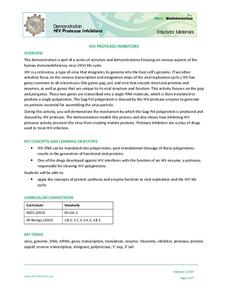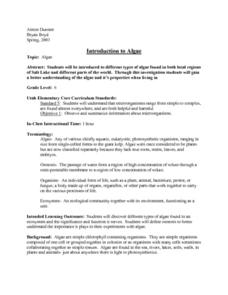Curated OER
Reproductive System
Fifth graders identify and define parts of the reproductive system. In this health lesson, the teacher introduces the parts of the reproductive system, then students match body part cards to the corresponding definition cards.
Curated OER
Redox and Electrochemistry
In this redox and electrochemistry activity, students identify the anode in electrode pairs of electrochemical cells. They also describe how a lemon battery works and how wet and dry voltaic cells work.
Curated OER
How DNA Controls the Workings of the Cell
In this DNA activity, learners compare the DNA sequence of a human and a cow to complete 4 fill in the blank questions and 4 short answer questions.
Curated OER
Organelles
Students explore the functions of major eukaryotic organelles. They compare and contrast prokaryotic and eukaryotic cells. Given diagrams and drawings, students take turns drawing structures, discussing their function, and labeling...
Curated OER
Flowering Plants
In this flowering plants instructional activity, learners compare the structure and function of a tree trunk and a leaf. This instructional activity has 1 true or false and 5 fill in the blank questions.
Curated OER
Let's Learn About Lettuce
Students learn more about lettuce. In this agriculture instructional activity, students listen to their instructor lecture about the history of lettuce. Students then participate in an activity that requires them to compare and contrast...
Nemours KidsHealth
Human Body Series: Immune System
When you work with school children, teaching about immunity and illness prevention is a priority! This approach includes a discussion, kid-friendly online articles, a creative writing assignment, and a quiz on the role of leukocytes and...
Virginia Department of Education
DNA Extraction from Strawberries
Has your class ever been astounded by the complexity of DNA analysis? Have they ever asked why genetic engineering has become so important to our daily lives? Young scientists perform DNA extraction on strawberries and explore how the...
National Center for Case Study Teaching in Science
Bad Fish, Bad Bird
In an advanced biology lesson, learners see a PowerPoint about biologist Dr. Westwood, a two-time victim of poisoning. Designed to be used with clickers in the classroom, you could modify the lesson by creating a worksheet from the...
Curated OER
DNA Replication
Young scholars create a model of DNA and simulate replication with their models in an activity that uses licorice, colored marshmallows, and toothpicks. Students also label a diagram of replication and indicate major parts of the DNA...
Curated OER
Integumentary System: A System, An Organ, the Biggest!
It is only six short slides, but an acceptable outline of the integumentary system. General facts about the system, layers, sublayers, and functions are listed as bullet-points. What would make this presentation more engaging for your...
Curated OER
Multiplication Tables Using Microsoft Excel
Eighth graders are introduced to Microsoft Excel as a computer application software program. They create multiplication tables in Microsoft Excel. Students work in small groups. They discuss the $ (anchor) function in Microsoft Excel.
Curated OER
Nervous System
Are you nervous about teaching the nervous system to your beginning biologists? Worry no more! This PowerPoint provides a note-taking guide and diagrams of the neuron and the brain. Viewers will walk away with a clear...
Biology Junction
Seed Plants: Gymnosperms and Angiosperms
One of the reasons plants found success on land relates to seed development. Scholars learn about many different forms of seeds and how they changed over time. It describes the structure and function of many different types of seeds in...
Curated OER
Making Blood!
students research blood's components, and use their math skills to recreate a model of whole blood using commonly found food items.
Curated OER
Life in a Drop of Pond Water
Learners investigate living creatures that inhabit a pond and explore how various organisms satisfy their needs within their environments. For this life in a drop of pond water lesson, students examine microorganisms under...
Give and Let Live
Blood and Transplant: Blood
Why is blood donation so important, anyway? Science and health classes across multiple grades benefit from an in-depth look into the need for and process of blood donation. With an emphasis on presenting the topic in a non-threatening...
Howard Hughes Medical Institute
HIV Protease Inhibitors
How do doctors fight a virus that's constantly mutating? Show science scholars how we fight HIV using one of its own most fundamental processes through a thoughtful demonstration. The lesson focuses on how protease inhibitors prevent HIV...
Beauty and Joy of Computing
Nesting Lists
Create lists within lists. The second lab in a series of five in the unit has pupils develop a simple contact list app. The tasks within the lab build the need for an abstract data type. Individuals build more complexity into their...
Curated OER
Raven Chapter 10 Guided Notes: Photosynthesis
Kim B. Foglia has designed a comprehensive series of AP biology worksheets. This one focuses learners on the progression of photosynthesis in plants. In this assignment, they identify structures and steps on high-quality diagrams, use...
Community Resources for Science
A Whole New World of DNA and Proteins
Lead your young scientists into an exciting world as they participate in a role play and experiment focused on proteins and DNA. After researching the Central Dogma of Biology, individuals or groups participate in a classroom...
Curated OER
Using the Microscope
Learners demonstrate their ability to properly make observations using a compound microscope. They prepare an onion skin slide and focus on it in both low and high power. Then they measure the diameter of one of the cells.
Curated OER
Skin as an Organ
Middle schoolers are introduced to human skin as an organ of the body with many roles, functions and interactions with other organs. They investigate the integumentary system in groups and complete a worksheet with their findings.
Curated OER
Introduction to Algae
Students explore different types of algae found in both local regions of Salt Lake and different parts of the world. They discover different types of algae found in an ecosystem and the significance and function it serves.

























